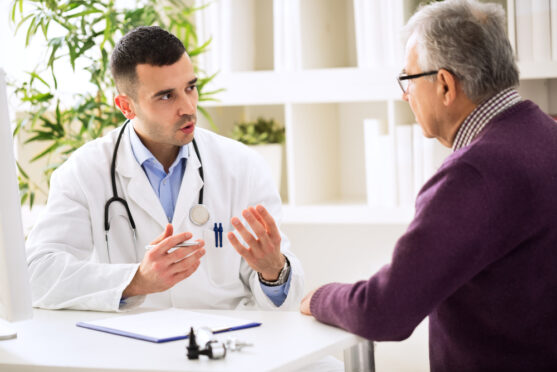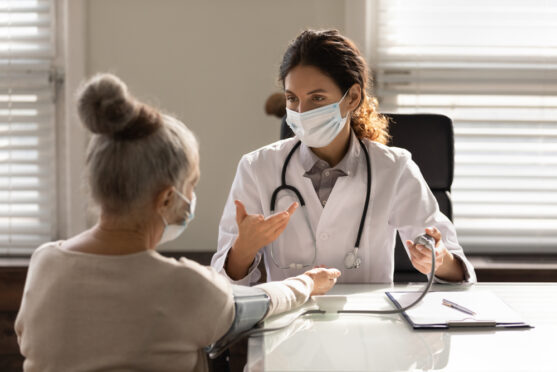A consultation with an oncologist can be crucial to your understanding of your disease, the treatment options, treatment outcomes, and more. In this article, we help you get the most out of your oncologist consultation.
Going into your consultation, your aim should be to have a lot more clarity about your present situation, your next steps, and what to expect in the near future, by the end of the consultation.

What will happen at the consultation?
Here are a few things you can expect the oncologist to do at your first consultation:
- The oncologist will examine you thoroughly especially in and around the affected part of the body. The doctor may also try to look for any swellings in the major joint areas like armpits, neck or groin.
- You will be asked questions related to the symptoms, personal history including smoking or alcohol consumption, family history, medical history, past treatments etc.
- Reports of any scans or blood tests you have undergone recently will be examined.
- The oncologist will then explain your condition and propose the best possible treatment for you. He or she may also ask for more tests for better understanding of disease which would help choose best treatment options.
- The immediate next steps in your treatment will be made clear. Sometimes, this may involve taking more scans and tests, if the oncologist feels he/she needs more information before planning the treatment.
- The oncologist will explain what the treatment will be like, where it will be done, what steps are involved in it, and roughly how much it will cost you.
- The oncologist will also be on a look-out for any other physical, or emotional symptoms that may be a result of the disease. Sometimes, he may refer you to a counsellor if he finds you under a lot of stress and anxiety.
- The oncologist may also prescribe some medication (usually for pain relief, or symptom management) that you can start on immediately.
What should I take with me for the consultation?
It’s best to prepare beforehand and ensure that all of the below are organised and available for your consultation:
- If this is your first consultation with an oncologist then carry all the recent reports of scans, biopsy report, endoscopies (if any) or blood tests along with you.
- If you have received treatment prior to this visit then keep a record of all the previous prescriptions and notes from any other oncologists you may have consulted. This will help the consulting oncologist understand what treatments have already been administered to you.
- Keep all the reports of scans and tests done in the last 6 months or more. Arrange them from the most recent to the older ones.
- Have a list of all your present symptoms and health issues, so that you do not forget to mention any of them.
- Also keep a checklist of questions you need to ask the oncologist. You can ask questions about available treatment options, their chances of success, expected side effects and risk of complications if any.
- You can also ask about changes in your lifestyle after a particular treatment, how to cope with that and if there would be a need for assistance.
- Take your primary caregiver along with you, so that he/she is clear on what the doctor is advising you.
- Take a notepad to make notes of any specific instruction from the oncologist. You can refer to this later, if in doubt.
- Ensure you have your insurance details if you are eligible for cashless treatments.
How long will the consultation take?
First consultations may take upto an hour, while follow-up consultations may take only 10-15 minutes. It depends on how much your condition has changed since the last consultation.
You can get priority bookings through Onco.com which reduces your waiting time at the hospital.
You can also electronically (via email or whatsapp) share your reports and other details with the oncologist beforehand, so that they can evaluate them before the appointment, to save time.

What questions should I ask the oncologist?
It’s very important to make a list of questions for your oncologist before you go for the consultation. You can check the questions off your list as you receive the answers for them.
Here are some questions you may want to include in your list, depending on their relevance to your situation.
General information
- What is the type of cancer I am suffering from?
- What is the stage of my cancer? Which organs have been affected?
- It’s always good to get a second opinion for any medical procedure. Can I share a second opinion with you?
- Can I continue prior medications prescribed for me? This could be medication related to other health issues like hypertension, diabetes etc.
- Can I safely continue working through this treatment? How much time off would I need for each procedure?
- Can I travel and continue with my daily tasks like driving or cooking during the treatment?
- How do I contact you in case of any sudden, unbearable side effects or symptoms?
- Is there a clinical trial for me? Where can I find information on clinical trials for me?
Treatment-related
- What are the different treatments I will have to undergo?
- How long will each treatment last for?
- What is the goal of my treatment?
- What are the possible side effects of each treatment?
- How much will the treatments, and drugs cost?
- What will be the possible outcome of each treatment? What can I expect by the end of each treatment?
- What are the chances that cancer will return after treatment? And what treatments will I have to undergo if this happens?
- Will this treatment affect my fertility? Is there anything I need to do about this before I start treatment?
- Is there any medication to manage this specific symptom as it is bothering me? If you have been having trouble sleeping, eating or staying calm, mention this and ask for advice.
Lifestyle changes
- Are there any dietary restrictions to be observed during the course of the treatment?
- What kinds of foods are good for me at each stage of the treatment?
- Will smoking or drinking of alcohol affect my treatment in any way?
- Should I exercise, if yes, then how much?
- What type of exercises should I avoid?
- Are there any measures I can take to reduce my risk of infections during this time?
After your consultation, if you realise you have forgotten to ask any question, contact your Care Manager. They will be able to help you with the answers.

